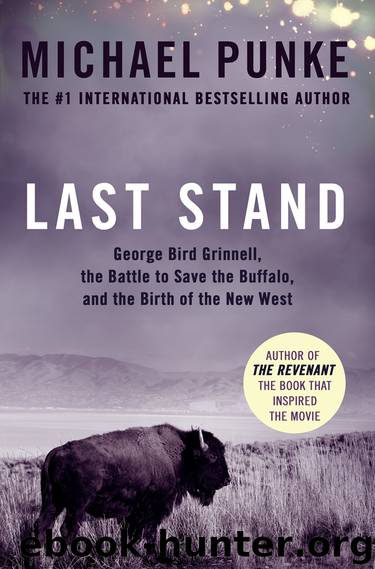Last Stand by Michael Punke

Author:Michael Punke [Michael Punke]
Language: eng
Format: epub
Publisher: HarperCollins Publishers
Published: 2016-02-12T05:00:00+00:00
Harry Yount: In 1880, Yellowstone’s first game warden reported that his job could “not be done by any one man, and I would respectfully urge for the purpose the appointment of a small, active, reliable police force.”
Courtesy of the National Park Service, Yellowstone National Park.
In an editorial on January 4, 1883, titled “The Park Grab,” Grinnell told his readers how the improvement company officials “related with tears in their eyes most heartrending stories of the slaughter of game, and told about the destruction of geysers and other natural wonders.” For people “ignorant to the subject,” Grinnell continued, the officials made it appear “that they were acting almost entirely from philanthropic motives.” As the terms of the proposed deal made clear, this was no act of charity. For an annual rent of $2 an acre, the improvement company would receive 640 acres (one square mile) around each of Yellowstone’s seven biggest attractions. To this exclusive dominion over major sites would be added a government-granted monopoly for stagecoach transportation, telegram communications, management of stores, guiding services, and even boating on Lake Yellowstone. To build its facilities, moreover, the company would have the right to cut as much park timber as it needed.18
A week later, Grinnell informed his readership of another improvement company activity in the park. Despite the fact that no contract had yet been formally agreed on, timber cutting and full-scale construction of a hotel was proceeding at Mammoth. To feed the 100 men building the hotel, the company had contracted with local hunters to supply 20,000 pounds of meat. Rather than expend the funds to import beef, the improvement company would save money by feeding its army of workers with “elk, deer, mountain sheep, and bison, killed in the park.”19
In fighting against the Yellowstone Park Improvement Company, Grinnell honed an argument that would be central to all of his future conservation efforts: Under a headline of “The People’s Park,” Grinnell called on Congress to protect the “interest of the people … from all monopolistic land-grabbing schemers.” Yellowstone, as Grinnell explained, belonged to everyone. “Every citizen shares with all the others the ownership in the wonders of our National pleasure ground, and when its natural features are defaced, its forests destroyed, and its game butchered, each one is injured by being robbed of so much that belongs to him.” In making this case, week after week, eventually year after year, Grinnell was defining the meaning of such novel concepts as “public land” and “national park.”20
Download
This site does not store any files on its server. We only index and link to content provided by other sites. Please contact the content providers to delete copyright contents if any and email us, we'll remove relevant links or contents immediately.
Sapiens: A Brief History of Humankind by Yuval Noah Harari(14389)
The Tidewater Tales by John Barth(12659)
Mastermind: How to Think Like Sherlock Holmes by Maria Konnikova(7343)
The Thirst by Nesbo Jo(6944)
Do No Harm Stories of Life, Death and Brain Surgery by Henry Marsh(6941)
Why We Sleep: Unlocking the Power of Sleep and Dreams by Matthew Walker(6723)
Life 3.0: Being Human in the Age of Artificial Intelligence by Tegmark Max(5558)
Sapiens by Yuval Noah Harari(5370)
The Body: A Guide for Occupants by Bill Bryson(5096)
The Longevity Diet by Valter Longo(5064)
The Rules Do Not Apply by Ariel Levy(4969)
The Immortal Life of Henrietta Lacks by Rebecca Skloot(4587)
Animal Frequency by Melissa Alvarez(4470)
Why We Sleep by Matthew Walker(4445)
The Hacking of the American Mind by Robert H. Lustig(4382)
Yoga Anatomy by Kaminoff Leslie(4363)
All Creatures Great and Small by James Herriot(4321)
Double Down (Diary of a Wimpy Kid Book 11) by Jeff Kinney(4269)
Embedded Programming with Modern C++ Cookbook by Igor Viarheichyk(4179)
